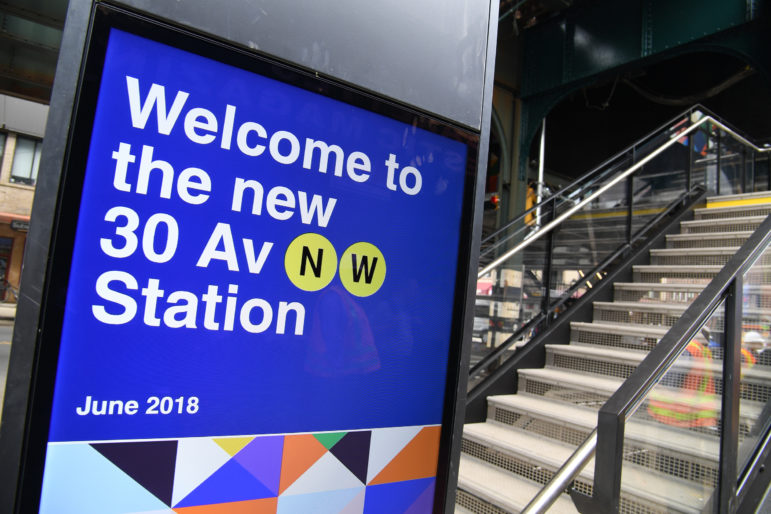
Marc A. Hermann / MTA New York City Transit
The 30th Avenue station in Astoria reopened in 2018 following a months-long renovation that rebuilt staircases, added new art and digital screens – but no elevators.
Accessibility rights advocates filed a federal lawsuit Wednesday against the MTA, accusing the transportation authority of discriminating against people with disabilities by renovating subway stations without installing elevators.
The class-action suit, filed by the nonprofit Disability Rights Advocates (DRA) on behalf of three plaintiffs and a coalition of accessibility rights groups, asserts that the MTA is violating the Americans with Disabilities Act when it overhauls subway stations without adding elevators.
Only about a quarter of the city’s 472 stations do have elevators, making a majority of the system inaccessible to riders with disabilities who can’t traverse stairs.
While the lawsuit seeks no monetary damages, it’s requesting a court order that would force the MTA to install elevators when undertaking station renovations. The suit points to dozens of such projects in recent years in which the MTA shuttered subway stations for months at a time, spending millions of dollars to build new staircases, add digital information screens and other upgrades – but failed to make the sites handicap-accessible.
“The MTA’s actions clearly demonstrate that they value amenities like Wi-Fi over serving passengers with disabilities,” Michelle Caiola, DRA’s managing director of litigation, said in a statement announcing the lawsuit.
Advocates have been pushing hard for the MTA to make the subway more accessible, saying the current lack of elevators creates transit hardships not just for disabled riders, but also for the elderly and parents with kids who are in strollers or just learning to walk. Earlier this year, a young mother pushing her child in a stroller died after falling down the stairs at a subway station in Manhattan, intensifying calls for accessibility upgrades (officials later said that the women’s death was likely caused by a pre-existing medical condition).
The new lawsuit follows another DRA filed in 2016 against the MTA for failing to install an elevator during a seven-month renovation of the Middletown Road subway station in the Bronx. The U.S. Attorney’s Office intervened in that case, and this past March a judge ruled that the renovation work “triggered the obligations set forth” under the ADA to install an elevator at the station if feasible, according to the ruling.
The plaintiffs and their attorneys said they filed Wednesday’s lawsuit hoping to extend that principle city-wide.
“For decades, the MTA has renovated stations at a cost of billions, blatantly evading the Americans with Disabilities Act,” Joe Rappaport, executive director of the Brooklyn Center for Independence of the Disabled, said in a statement. “It’s long past time access is first among the MTA’s priorities, not an afterthought or not thought of at all.”
The MTA is making efforts to address subway access for disabled riders: New York City Transit President Andy Byford’s “Fast Forward” plan to modernize the subways pledges to install elevators at 50 new stations in the next five years, and at another 130 stations over the next decade, with the goal of having “all possible stations” made accessible by 2034. Still, New York’s subways rank well below the transit systems of other comparable U.S. cities when it comes to accessibility.
In a statement, MTA Chief External Affairs Officer Maxwell Young conceded that the authority still has a “long way to go” when it comes to subway accessibility, but stressed that improvements are underway and that they’re “fully committed” to carrying out the changes laid out in the “Fast Forward” plan.
“While we can’t comment on the pending litigation, the MTA has made an historic commitment to improving accessibility at a faster rate than ever before,” he said. “We are also committed to increasing the speed and quality of our fully wheelchair accessible buses by completely re-envisioning the network for the first time since its creation.”









2 thoughts on “Commuters with Disabilities Sue MTA to Install Elevators During Subway Station Renovations”
Good initiative for disabilities. This world is for all. We can help each other. Happy to hear that commuters will use that elevators hereafter. Thanks for the respective people under subway station.
it was great and very innovative thanks for sharing it.